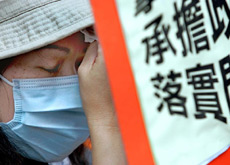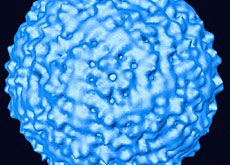Scientists hail potential of antibody technique

Scientists at a Swiss research institute have devised a new method of producing human antibodies, the body’s main defence against disease.
Tests indicate that the technique could be used in the development of a treatment for the Sars pneumonia virus.
Details of the experiments, conducted by Antonio Lanzavecchia and his team at the Institute for Research in Biomedicine in Bellinzona, are to be published in next month’s edition of the scientific journal, “Nature Medicine”.
Antibodies are considered to be the most efficient way of fighting disease.
But producing effective antibodies to deal with Sars, which first emerged in China in late 2002, is next to impossible with current techniques.
Researchers face the same problem with a number of other diseases, including Aids and Hepatitis C.
“Until now, nobody has managed to create antibodies strong enough and with broad enough applications that could neutralise a virus [like Sars],” Lanzavecchia told Swiss radio.
Isolating antibodies
As part of their research at the institute in canton Ticino, the team isolated 35 antibodies using specific lymphocytes – a form of white blood cell – from a patient who had recovered from Sars.
“We were able to produce antibodies in just a few weeks,” said Lanzavecchia.
Tests – conducted in conjunction with scientists in Germany, Italy and the United States – found that the antibodies neutralised the Sars virus and inhibited its replication in laboratory mice.
The next step, according to scientists at the institute, is to test the antibodies on other laboratory animals before proceeding with human clinical trials.
Lanzavecchia said his team had focused on Sars because scientific investigation into the disease had not led to an effective means of tackling the virus.
“We chose this disease because nobody has yet found a way of fighting it.”
First step
Details of the findings come one month after Swiss vaccine firm Berna Biotech announced it was abandoning plans to develop a vaccine against Sars.
At the time, the Bern-based company said it was stopping trials because the disease was no longer seen as a priority by global health authorities.
Lanzavecchia warns that the success of the initial research in Bellinzona does not mean that a treatment for Sars is imminent.
“What we are talking about here is just a first step,” he said.
But he added that the research conducted highlighted the potential use of antibodies in the fight against a number of other diseases.
“This technique could be applied to all sorts of infectious diseases, such as Aids, Hepatitis C and Ebola… and could even be used against cancerous tumours.”
swissinfo
Sars appeared in Asia in late 2002.
Over 8,000 people were infected by the virus.
According to the World Health Organization, 774 died from the disease, the majority of them in China, Hong Kong, Taiwan, Canada and Singapore.
Bellinzona’s Institute for Research in Biomedicine opened in 2000 and is financed by the city, canton Ticino and the Swiss authorities, as well as by other institutes and private sources.
The institute’s ten research groups focus on cellular and molecular immunology.

In compliance with the JTI standards
More: SWI swissinfo.ch certified by the Journalism Trust Initiative



You can find an overview of ongoing debates with our journalists here . Please join us!
If you want to start a conversation about a topic raised in this article or want to report factual errors, email us at english@swissinfo.ch.